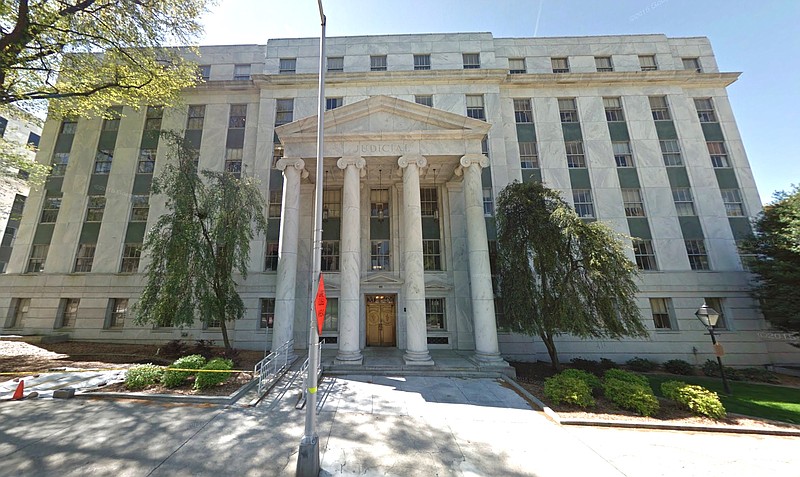After a Walker County woman's appeal took 19 years, the Georgia Supreme Court is demanding that criminal cases throughout the state move faster.
In a unanimous opinion issued Monday, Associate Justice David Nahmias wrote that defendants in Georgia sometimes have to wait too long before a higher court hears an appeal. Nahmias and the other justices did not offer a concrete solution. But they made a demand: The Council of Superior Court Judges must create a uniform rule by Sept. 17.
The rule would force judges at the county level to figure out a way to speed up the appeals process.
In the opinion, Nahmias listed 30 cases that took too long to come before the state's top court since 2015. The waiting period for those cases ranged from six years to 21 years. But the case that pushed the justices over the top? The conviction of Margie Owens, a Walker County woman accused of killing her husband in May 1997. The Supreme Court just vacated one count of her conviction two decades later.
"There are rarely good examples for long delays," Nahmias wrote. "And even if long-delayed appeals rarely result in outright reversals of convictions or only retrials or resentencings, these extended and unjustified delays in resolving criminal cases make our state's criminal justice system appear unfair and grossly inefficient."
In the opinion, the supreme court did not list any specific causes for long delays. The justices merely asked for a solution, telling Superior Court judges to meet with the state bar, the Public Defender Council, the Association of Criminal Defense Lawyers, the Prosecuting Attorneys' Council of Georgia and the Council of Superior Court Clerks.
The Uniform Superior Court Rules Committee, which consists of about 15 Superior Court judges, then will propose a new rule. The Supreme Court will have to approve it. Assuming it does, judges at the county level then will have to follow that rule.
If a Superior Court judge slips up, a defense attorney will have an opening to appeal to a higher court. For example, they could ask for a conviction to be overturned, pointing out that the lower court didn't follow the rules.
What change could speed up cases? That is yet to be determined.
In Owens' case officers arrested her after they found her husband dead in their trailer. Someone shot him in the back. Investigators found her outside, drunk and angry. She said she and her husband got into an argument, and she thought she shot him.
During her trial, Owens testified that her husband hated the breakfast she cooked that morning. She said he slapped her and put a gun to her head. Later that day, when she asked him to extinguish the charcoal on the grill, he choked her, she said. She said she grabbed something to force him off and didn't realize she had shot him.
A jury convicted her of voluntary manslaughter, felony murder and possession of a firearm during the commission of a crime. However, the Georgia Supreme Court had ruled in 1992 that a defendant cannot be guilty of both voluntary manslaughter and felony murder.
Superior Court Judge Ralph Van Pelt Jr., who presided over Owens' case 20 years ago, said Monday that the mistake was the result of a quirk in the legal system. He said the higher court is often changing how criminal charges interact with each other, and sometimes judges and lawyers slip.
"Sentencing isn't all that simple," he said. "[Appeals courts] send things back for re-sentencing more often than you'd think. Getting into questions about what merges and what doesn't can be pretty complicated."
But then there is the issue of the delay in the case. According to the opinion released Monday, Owens filed a motion for a new trial in June 1998. The case didn't go before a Superior Court judge until July 2006. Within two months, a judge rejected that motion.
Owens' lawyer appealed, but the Georgia Supreme Court didn't get her file until 11 years later. According to the opinion, Walker County Clerk of Court Carter Brown, who took office in 2009, didn't know about the appeal until right before he sent it to the supreme court. Brown did not return a call or email seeking comment Monday.
Van Pelt said one cause for delay in the early years was the death of the court reporter who followed Owens' original trial. Lawyers and judges need a transcript of a case before proceeding on an appeal. Today, court reporters record the trial and save their notes on a hard drive.
But 20 years ago, the court reporter typed out his notes on paper. Because cases can last longer than a week, the notes can be hundreds of pages high. And reporters don't write out every word; they use shorthand. Different reporters use different shorthand styles, with different abbreviations.
When this particular reporter died, the court had to find somebody trained in the same methods. That person could then read the stacks and write out the full transcript. There were several cases like this, Van Pelt said. The process took years.
With its opinion Monday, the Supreme Court moved Owens' case back to Walker County Superior Court, where she will receive a new sentence for voluntary manslaughter. While her felony murder charge carried a life sentence, she cannot be confined for more than 20 years for voluntary manslaughter, meaning that sentence is close to expiring, if it hasn't run up already.
Her other charge, possession of a firearm during the commission of a crime, is supposed to run for five years at the end of her other charges. That means she may not get out until 2023.
Contact staff writer Tyler Jett at 423-757-6476 or tjett@timesfreepress.com. Follow him on Twitter @LetsJett.
